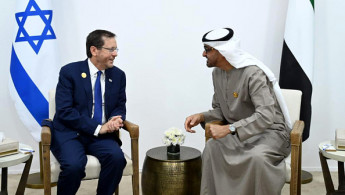UAE plans to maintain ties with Israel despite Gaza outcry, sources say
The United Arab Emirates plans to maintain diplomatic ties with Israel despite international outcry over the mounting toll of the war in Gaza and hopes to have some moderating influence over the Israeli campaign while safeguarding its own interests, according to four sources familiar with UAE government policy.
Abu Dhabi became the most prominent Arab nation to establish diplomatic ties with Israel in 30 years under the US-brokered Abraham Accords in 2020.
That paved the way for other Arab states to forge their own ties with Israel by breaking a taboo on normalising relations without the creation of a Palestinian state.
The mounting death toll from Israel's invasion of the Gaza Strip has stirred outrage in Arab capitals.
UAE President Sheikh Mohamed bin Zayed Al Nahyan spoke last month with Israeli Prime Minister Benjamin Netanyahu.
UAE officials have publicly condemned Israel's actions and repeatedly called for an end to the violence.
In response to a request for comment for this story, an Emirati official told Reuters the UAE's immediate priority was to secure a ceasefire and to open up humanitarian corridors.
As well as speaking to Israel, the UAE has worked to moderate public positions taken by Arab states so that once the war ends there is the possibility of a return to a broad dialogue, said the four sources, who asked not to be identified because of the sensitivity of the matter.
Sheikh Mohamed met in Abu Dhabi on Thursday with Qatar's Emir Sheikh Tamim bin Hamad Al Thani to discuss calls for an immediate humanitarian ceasefire, amid Qatari-brokered talks for the release of a limited number of hostages in return for a break in the fighting.
"The UAE and Qatar stand firm in urging the need to advance de-escalation efforts and secure a just, lasting, and comprehensive peace in the region," Sheikh Mohamed said on social media after their discussions.
Despite closer economic and security ties with Israel forged over the past three years, Abu Dhabi has had little apparent success in reining in the Gaza offensive, which has led to the death of more than 11,000 people, according to Palestinian officials.
Hamas killed around 1,200 people in its surprise attack on Israel and some 240 hostages were taken, Israeli authorities have said.
Izzeldin Abuelaish, a Palestinian doctor who has been nominated for a Nobel Peace Prize five times, is resolute in his advocacy for peace even after Israeli forces killed 25 members of his family 👇 pic.twitter.com/e5aIaSI0bh
— The New Arab (@The_NewArab) November 10, 2023
Amid the impasse, the UAE has grown increasingly frustrated with its most important security partner Washington, which it believes is not exerting enough pressure to end the war, the four sources said.
Anwar Gargash, diplomatic adviser to the UAE president, said this week that Washington needed to end the conflict swiftly and initiate a process to resolve the decades old Israeli-Palestinian issue by addressing refugees, borders and occupied East Jerusalem.
Speaking on October 18 at the UN Security Council, where the UAE holds a rotating seat, ambassador Lana Nusseibeh said that Abu Dhabi had sought via the Abraham Accords with Israel and the United States to deliver prosperity and security in a new Middle East through cooperation and peaceful co-existence.
"The indiscriminate damage visited upon the people of Gaza in pursuit of Israel's security risks extinguishing that hope," she said.
The UAE continues to host an Israeli ambassador and there was no prospect of an end to diplomatic ties, which represented a longer-term strategic priority by Abu Dhabi, the sources said.
The accord was motivated, in part, by shared concerns over the threat posed by Iran, as well as a broader economic-driven realignment of Abu Dhabi's foreign policy.
Iran's Raisi labels Israeli army 'terrorist organisation'
— The New Arab (@The_NewArab) November 11, 2023
Iraq's Harir airbase targeted by armed drone
ICRC MENA director: information from Al Shifa 'distressing'
📰Read here:https://t.co/lFwEWlcTsUhttps://t.co/tzxT88yLHG
The UAE sees Iran as a threat to regional security, although in recent years it has taken diplomatic steps to de-escalate tensions.
Israel and the UAE have developed close economic and security ties in the three years since normalisation, including defence cooperation.
Israel supplied the UAE with air defense systems after missile and drone attacks on Abu Dhabi in early 2022 by the Houthi movement in Yemen.
Bilateral trade has exceeded $6 billion since 2020, according to Israeli government data. Israeli tourists have thronged hotels, beaches and shopping centres in the UAE, which is an OPEC oil power and a regional business hub.
"They (UAE) have gains that they don't want to lose," said one of the sources, a senior diplomat based in the Middle East.
Even prior to the October 7 attack, however, Abu Dhabi was concerned by the failure of Israel's right-wing government to curb expansion of Jewish settlements in occupied West Bank and repeated visits by right-wing religious Israelis to the compound that houses the Al Aqsa mosque, the third-holiest site in Islam.
None of four sources ruled out that the UAE could downgrade or sever its ties if the crisis escalated.
Sources said that the displacement of the Palestinian population from the Gaza Strip or the West Bank into Egypt or Jordan was a red line for Abu Dhabi.
James Dorsey, a senior fellow at the National University of Singapore, said the war in Gaza had discredited the notion that economic cooperation on its own could build a stable region.
"The new Middle East was being built on very fragile ground," he told Reuters.
Reuters contributed to this story.





 Follow the Middle East's top stories in English at The New Arab on Google News
Follow the Middle East's top stories in English at The New Arab on Google News


